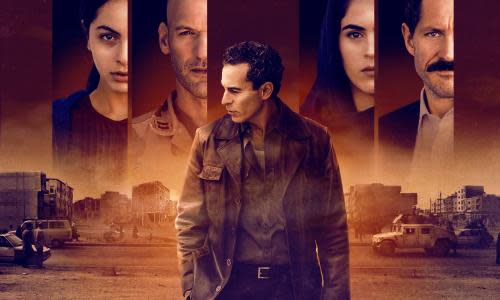Thriller finally gives Iraqis key roles in 2003 invasion story

She has become used to playing characters who have neither passports nor backstories. Now, after landing a role offering both, British actress July Namir has spoken out about the importance of challenging stereotypes on TV.
“Usually I’m just asked to play refugees who are then portrayed as this cancerous maw sucking on society,” says Namir, who stars in new Channel 4 drama Baghdad Central, which starts next month. “Being asked to play someone who has their own internal thoughts and all these opinions and feelings was a real change.”
Palestinian star Leem Lubany, who plays Namir’s older sister, agrees that it remains hard for actors of Middle Eastern descent to find genuinely nuanced roles. “A lot of the time, when I get a script or go to an audition, I’m just being asked to tell the same story again and again but with a different name,” she says. “That gets really boring after a while.”
By contrast, Baghdad Central offered both actors a chance to show that they could do much more than stand mutely on the sidelines.
The six-part thriller, which is loosely based on Elliott Colla’s 2014 crime novel, follows former Iraqi police officer Muhsin Kadr al-Khafaji (Waleed Zuaiter) who is the sole carer for his sick younger daughter, Mrouj (Namir), following his wife’s death, and estranged from his older child, Sawsan (Lubany). When Sawsan goes missing, Muhsin finds himself caught up in a tale of murder and betrayal with troubling links to the US-controlled Green Zone.
“What really stood out for me is that for once you see this story from the side of the Iraqis,” says Lubany. “We’re shown how much hope Sawsan has after the Americans arrive and why that feels like freedom to her and how that gradually changes. What really makes this series stand out is that it shows you the story from the perspective of the Iraqis and not just what the Americans or British feel about it.”
The drama is created by Stephen Butchard, the writer of House of Saddam, who says that providing that domestic perspective was crucial to establishing the tone. “When we think of Baghdad in 2003 we think of it from a political or military point of view and we forget about the everyday experiences of the people on the ground. It was really important to us to present a true representation of what it felt like to be a young woman in Iraq at this time. Sawsan is young and ambitious and wants to succeed and I think that’s not a story we often tell.”
While the series was shot in Morocco for safety reasons, Butchard and producer Kate Harwood were keen to ensure the series’ authenticity. Thus, while the main cast speak in English, there are also plenty of scenes in Iraqi Arabic with subtitles. “I wanted to put the audience on the streets of Baghdad straightaway,” Butchard says of the opening scene which takes place at a family birthday party. “A scene like that really grounds the story from the start and makes it clear that even if you don’t understand the culture or the language being spoken, you recognise the emotions and see that these are people trying to get on with living ordinary lives.”
The writer was also keen to avoid writing polemically about the aftermath of the invasion. “It’s very easy to tell this story in black-and-white terms with no grey but that would be wrong,” he says. “There are people on all sides who are doing right and people on all sides doing wrong and people who are simply trying to get through the day and do a job in difficult circumstances.”
Harwood agrees that a large part of Baghdad Central’s appeal comes from the way in which it merges a tense detective story involving Zuaiter and Bertie Carvel (who plays a British intelligence officer) with the more personal family tale.
“At its heart it’s the story of two sisters and their relationship with each other and their father,” she says. “It’s about this little kernel of people who get really screwed over by what’s happened and what happens to them next, largely because of that.”
For Namir and Lubany, that personal story has a far wider appeal. Both actors say that they hope the depth of characterisation on show in the series will help to push the door open for further opportunities for Muslim and Arab actors on British TV.
“When you constantly formulate a point of view on a specific race or ethnic group, through the press, for example, then people start to think they don’t love like we love, they don’t feel like we feel,” says Namir. “One of the most important things this show does is demonstrate that isn’t true. The television market is opening up and people are realising that stories like this have an audience. People want to see themselves on screen. They want different stories to be told.”

 Yahoo News
Yahoo News 